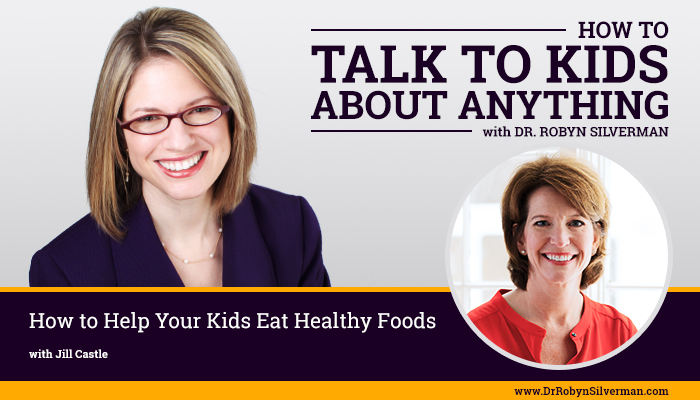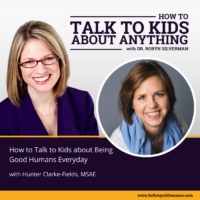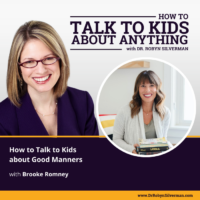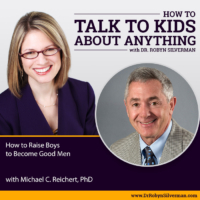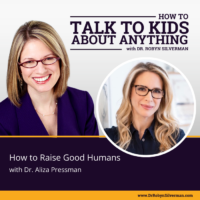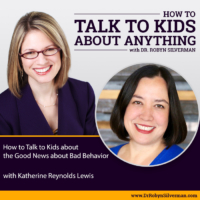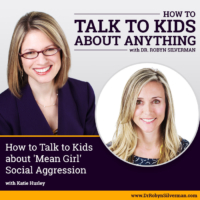Podcast: Play in new window | Download
Subscribe: Apple Podcasts | RSS | More
How to Talk to Kids about Picky Eating & Good Nutrition
This podcast focuses on raising healthy eaters who have a positive relationship with food. Jill Castle, registered dietician and nutritionist gives us practical tips and scripts to help our children feel good about food and meal times so that feeding our children doesn’t become a struggle. We also discuss “food as fuel,” and how young athletes need to eat in order to have the energy to thrive in their sport of choice. Of course, this podcast is for any child—and eating is something we all do…everyday!
Special Guest: Jill Castle
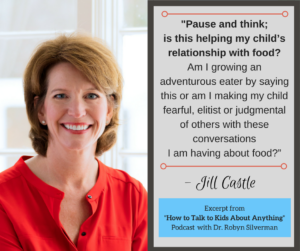 Jill Castle is a registered dietitian/nutritionist and a specialist in pediatric nutrition. She currently works as a private practitioner, online educator, consultant, and speaker. She is the author of Eat Like a Champion: Performance Nutrition for Your Young Athlete and co-author of Fearless Feeding: How to Raise Healthy Eaters from High Chair to High School. She’s also the creator of The Nourished Child, a childhood nutrition blog and podcast, and The Kids Healthy Weight Project, an online course for parents. Jill is a national and international speaker, focused on topics including childhood nutrition, feeding, picky eating, youth sports nutrition, and childhood obesity. Jill is regularly quoted in popular print and online publications as a leading childhood nutrition expert and is a regular contributor to US News & World Report, USA Swimming and Bundoo.com. You can find out all about Jill Castle at JillCastle.com
Jill Castle is a registered dietitian/nutritionist and a specialist in pediatric nutrition. She currently works as a private practitioner, online educator, consultant, and speaker. She is the author of Eat Like a Champion: Performance Nutrition for Your Young Athlete and co-author of Fearless Feeding: How to Raise Healthy Eaters from High Chair to High School. She’s also the creator of The Nourished Child, a childhood nutrition blog and podcast, and The Kids Healthy Weight Project, an online course for parents. Jill is a national and international speaker, focused on topics including childhood nutrition, feeding, picky eating, youth sports nutrition, and childhood obesity. Jill is regularly quoted in popular print and online publications as a leading childhood nutrition expert and is a regular contributor to US News & World Report, USA Swimming and Bundoo.com. You can find out all about Jill Castle at JillCastle.com
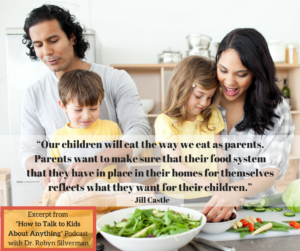 Is food sometimes a fight in your house? As parents, we all want our kids to be healthy- which isn’t always easy when children may not eat the foods we wish they would, when food is a fight, if we have a picky eater or a kid who only eats “blond or beige food” dino nuggets and mashed potatoes but no veggies or fruit or as some of my friends have struggled with- kids who are only into carbs- athletic kids who aren’t eating enough given their activity level or a kid who struggles with healthy eating in a different way- well, guess what? We’ve got a top expert, Jill Castle, who focused on children’s healthy diets and pediatric nutrition today who is going to help us with balancing out food extremes and ensuring that our children have a healthy relationship with food.
Is food sometimes a fight in your house? As parents, we all want our kids to be healthy- which isn’t always easy when children may not eat the foods we wish they would, when food is a fight, if we have a picky eater or a kid who only eats “blond or beige food” dino nuggets and mashed potatoes but no veggies or fruit or as some of my friends have struggled with- kids who are only into carbs- athletic kids who aren’t eating enough given their activity level or a kid who struggles with healthy eating in a different way- well, guess what? We’ve got a top expert, Jill Castle, who focused on children’s healthy diets and pediatric nutrition today who is going to help us with balancing out food extremes and ensuring that our children have a healthy relationship with food.
The podcast provides:
- What healthy eating is for our kids and what are some ways we can help kids eat in a healthy way?
- Where we can sometimes go wrong and how we can make the conversation about food easier.
- If our child is not eating in a healthy way, what we can say or do to help them eat in a healthier manner.
- The dangers of talking about food in extremes?
- How a discussion of body image can get incorporated and how we can talk about food and convey healthy eating without contributing to an unhealthy relationship with food.
- Some important tips to help your young athlete eat well given the energy sports take.
- What we can do if we believe our child has an unhealthy relationship with food.
- Scripts: What to say when your child doesn’t eat and then complains that s/he’s hungry later.
- Three ways parents get tripped-up about food.
- How to talk to athletes about food as fuel.
Important Messages:
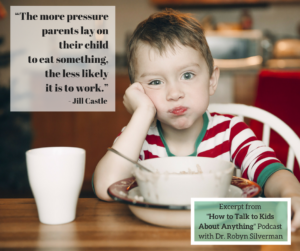
- Children are learning! Mistakes are ok. The goal is to raise a child who likes a host of different kinds of food and can self regulate.
- Parents need to include different types of foods in their own diets if they want to see their kids eat different types of foods.
- Avoid pressuring your child to eat a certain food.
- We have to remove emotions and investment with regard to how your child eats. Remove the pressure.
- Picky eaters still need to join the family for the meal.
- Make one family meal, considering your picky eater’s preferences as well as your family’s preferences- come up with a meal that can satisfy everyone- including 1 or 2 safe foods- a food that is safe, recognized and liked. The other foods on the table expose the child to new or other foods.
- Children experience the natural consequence if they choose not to eat that they are a little more hungry than they need to be and have to wait until the next snack or mealtime to eat. This can change eating patterns. Let the natural consequences play a role.
- Many children are plainer eaters- that’s ok- you can serve “deconstructed meals.”
- Parents are the nutritional gate keeper. Provide nutritional options and allow your child to choose.
- Your child grows overnight so you want your child to eat well before bed.
- There’s a lot of enjoyment of food that I think we need to bring back into the conversation when we talk about nutrition.
- Stay neutral about food. Say; we all have to eat and food is the fuel that makes our bodies grow and go.
- You’ve got 18 years- chill out a little around food!
- Snacks need to hold a child over for 2-3 hours until the next meal.
- Ask yourself, is what I am saying about food helping your child?
Notable Quotables:

- “One trick doesn’t fix everything or every family or every child. It often takes a lot of different tools in your toolbox to work through different issues.”
- “Healthy eating for kids, in my mind, is making sure they get the variety of nutrients they need to grow and develop well, while at the same time learning about different kinds of foods, their appetite and how to regulate it and how to navigate through the very complex variety of food that we live in today.”
- “Healthy eating is not a set of rules, a certain diet or a certain believe system. Children are learning about nutrition and they’ve got 18 years to learn about food and themselves and the way that they manage food in their lives. The goal is to raise children who like a wide variety of different foods and can self regulate and appreciate all the different kinds of foods there are out there to experience.”
- “Our children will eat the way we eat as parents. Parents want to make sure that their food system that they have in place in their homes for themselves reflects what they want for their children.”
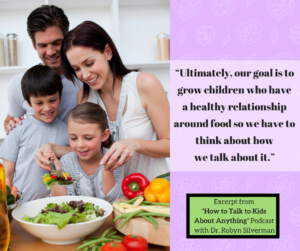
- “The more pressure parents lay on their child to eat something, the less likely it is to work.”
- “If you are somebody who is making a back-up meal or a Plan B meal for your picky child, it’s important to know that when you do that, you are short-circuiting your child’s ability to try new foods. Children who are catered to are less likely to try new foods and are more likely to have a nutritionally deficient diet.”
- “If you are feeding a toddler, you are feeding them about 6 times a day. These are opportunities to eat not ‘have to’ times to eat. Parents sometimes get these confused.”
- “Parents; you are in charge of the food. Your child is going to follow along and follow suit but you make the food decisions. You are the nutritional gate- keeper. So at snack time, provide 2 nutritional choices and then allow your child to choose. Strategically think about the foods you are offering and how you’re offering them.”
- “We get tripped up as parents around food. We let our own motivations about how we want our children to eat to cloud our judgment. If we put a lot of fear around food it can make us speak about food in ways that can grow fear and change our children’s preferences around food.”
- “Ultimately, our goal is to grow children who have a healthy relationship around food so we have to think about how we talk about it.”
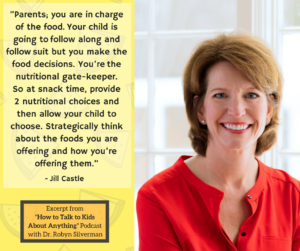 “Every parent wants their child to grow up healthy and to eat healthy but the way we get there is vastly different amongst families.”
“Every parent wants their child to grow up healthy and to eat healthy but the way we get there is vastly different amongst families.”- “Children always look to their parents as their #1 role model on everything they are considering in their lives, including their health!”
- “Careful that you don’t focus so much on the feeding and not enough on the food!”
- “Look to yourself as the change-agent. Any child needs her parents’ fortitude, knowledge and confidence first.”
- “It’s not nutrition if it doesn’t get eaten.”
- “Pause and think; is this helping my child’s relationship with food? Am I growing an adventurous eater by saying this or a I making my child fearful, elitist or judgmental of others with these conversations I am having about food?”
Resources:
Short-order Cook Syndrome article https://jillcastle.com/childhood-nutrition/overcome-short-order-cook-syndrome/
70 Sports Snacks https://jillcastle.com/young-athletes/healthy-sports-snacks-kids/

